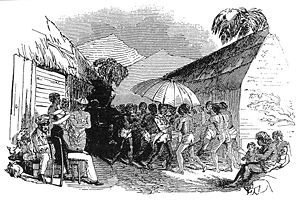Isubu people
 Joseph Merrick at an Isubu funeral in Cameroon, 1845. Joseph Merrick at an Isubu funeral in Cameroon, 1845. |
|
| Total population | |
|---|---|
| (Total: 800 (1982)) | |
| Regions with significant populations | |
| Cameroon | |
| Languages | |
| Suwu, Duala, Malimba, Mokpwe, Wumboko | |
| Religion | |
| Predominantly Christianity, African Traditional Religion | |
| Related ethnic groups | |
| Bakole, Bakweri, Bamboko, Duala, Limba, Mungo, Wovea |
The Isubu (Isuwu, Bimbians) are an ethnic group who inhabit part of the coast of Cameroon. Along with other coastal peoples, they belong to Cameroon's Sawa ethnic groups. They were one of the earliest Cameroonian peoples to make contact with Europeans, and over two centuries, they became influential traders and middlemen. Under the kings William I of Bimbia and Young King William, the Isubu formed a state called Bimbia.
The predominant Isubu oral history holds that the ethnic group hails from Mboko, the area southwest of Mount Cameroon. Tradition makes them the descendants of Isuwu na Monanga, who led their migration to the west bank of the Wouri estuary. When a descendant of Isuwu named Mbimbi became king, the people began to refer to their territories as Bimbia.
Portuguese traders reached the Wouri estuary in 1472. Over the next few decades, more Europeans came to explore the estuary and the rivers that feed it, and to establish trading posts. The Isubu carved out a role for themselves as middlemen, trading ivory, kola nuts, and peppers from the interior. However, a major commodity was slaves, most bound for plantations on nearby islands such as Annobon, Fernando Po, Príncipe, and São Tomé. By the 16th century, the Isubu were second only to the Duala in trade. The earliest Isubu merchants were likely chiefs or headmen. Bimbia, the primary Isubu settlement, grew quickly.
...
Wikipedia
